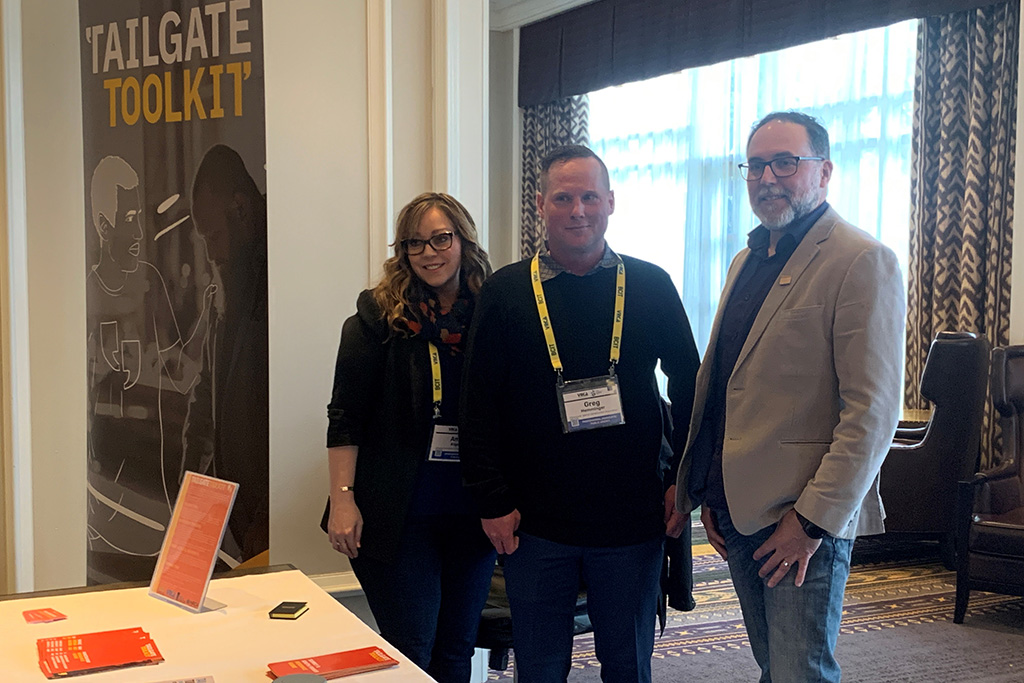For Vancouver Island Construction Association (VICA) harm reduction co-ordinator Greg Hemminger, the mission behind addressing the industry’s substance use crisis through the association’s Tailgate Toolkit is personal.
“I have lived experience unfortunately, or fortunately. I think I’m better for having gone through it,” Hemminger said. “I’m five years clean and sober.”
He and VICA CEO Rory Kulmala recently spoke at the Vancouver Regional Construction Association’s Construction Leadership Forum on May 13.
Their session, entitled Tailgate Toolkit: Addressing the Substance Use Crisis detailed how construction can better deal with the tragic and ongoing substance use crisis throughout British Columbia, which disproportionately affects men aged 19 to 54 in the industry.
Hemminger explained to attendees he used harm reduction, saw a doctor regularly, used sanitized supplies and went through a complete rehab treatment. He also shared he was involved with a woman who also struggled with substance use who passed away three months into his rehabilitation.

“My fiancé was too scared of who she was sober, but unlike me she could hide it,” he said. “Harm reduction saved my life. If she’d practiced it, it would have saved hers.”
Hemminger explained he and Kulmala are trying to change the terminology used when people speak about substance use including moving away from the term “overdose.”
“I think people think (when that term is used) you have a death wish. They think copious amounts of drugs and an overindulgent lifestyle and that’s simply not the case. We’re dealing with a toxic drug supply and people are making small mistakes,” he said.
“These are recreational drug users, sometimes first-time drug users, and they’re getting one drug or think they’re getting that drug and they’re getting fentanyl and they’re dying. No one should die for a mistake, whether they’re young, old or in-between. The goalposts have moved so we need to approach this from a different perspective.”
“We spend a lot of time on harm reduction on the jobsite, PPE, fall protection. That’s all great when you’re on the site, but 69 per cent of the people who die are dying alone, in their own homes,” Kulmala said.
“We spend so much time making sure people go home safe. Now we want them to come back safe. Your problem has just started if they don’t come back the next day.”
VICA’s Tailgate Toolkit project, in partnership with other B.C. construction associations, aims to formalize these efforts through a series of components including toolbox talks to reduce stigma, supervisor training, regional resources in both print and digital form and an online forum exclusive to construction workers called “Hammer Time.”
“The Tailgate Toolkit is a project we initiated a year ago to introduce our workers and our sector to the overdose crisis, which we’d rather call a toxic drug supply, and how it’s affecting our workers. It’s a way to introduce this issue to our workers, reduce stigma and try to help workers find the resources they need ultimately for recovery and better health,” Kulmala said.
Outdated attitudes about masculinity in the industry add to the problem, Hemminger explained.
“As men, we are graded on how little we complain. We celebrate toughness and not talking out our fears or vulnerabilities. We need to change those attitudes because people are dying alone. They’re suffering in silence,” he said.
“They think there’s going to be punitive measures against them if they say, ‘Hey, I’m not doing too well. I’m struggling and now I’m dependent upon a pain medication,’” Hemminger added. “We need to change the attitudes and start a discourse between employer and employee. We need to normalize this, realize it’s a human and societal problem and we’re all at risk.”
Follow the author on Twitter @JOCFrey.








Recent Comments